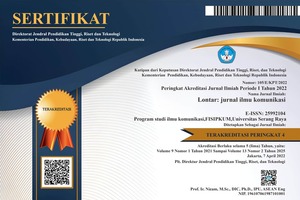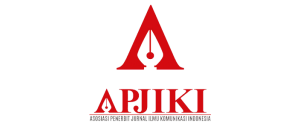KONTRA PRODUKTIF KETERBUKAAN INFORMASI PUBLIK
DOI:
https://doi.org/10.30656/lontar.v4i3.362Abstract
Pemahaman dan Makna Keterbukaan Informasi Publik (Studi Fenomenologi tentang Pemahaman dan Makna Keterbukaan Informasi Publik Terhadap Pejabat Pengelola Informasi dan Dokumentasi (PPID) di Lingkungan Pemerintah Provinsi Banten). Tujuan penelitian adalah untuk mengetahui pemahaman PPID di Lingkungan Pemerintah Provinsi Banten terhadap Keterbukaan Informasi Publik, mengetahui tentang makna pemohon informasi dari PPID di Lingkungan Provinsi Banten dan mengetahui tentang makna keterbukaan informasi publik dari PPID di Lingkungan Pemerintah Provinsi Banten. Metode penelitian yang digunakan dalam penelitian ini adalah metode penelitian kualitatif dengan pendekatan fenomenologi. Teori yang digunakan yaitu Fenomenologi Alfred Schutz, Teori Interaksionisme Simbolik, dan Teori Kontruksi Sosial. Hasil penelitian ini adalah menunjukkan bahwa pemahaman PPID di Lingkungan Pemerintah Provinsi Banten terhadap keterbukaan informasi publik sudah tinggi. PPID sudah mampu melakukan ekstrapolasi, yakni kemampuna melihat apa yang ada dibalik yang tertulis dan kemampuan apa yang akan terjadi akibat berlakunya Undang-undang Nomor 14 Tahun 2008 tentang Keterbukaan Informasi Publik. Makna pemohon informasi bagi PPID di Lingkungan Pemerintah Provinsi Banten adalah sebagai pihak yang berpartisipasi dalam penyelenggaraan pemerintahan, pihak yang menggunakan haknya untuk memperoleh informais publik, pihak yang asal meminta informasi untuk menaikan daya tawar, dan pihak yang menggunakan cara memohon informasi untuk bertemu dengan pejabat. Sedangkan makna keterbukaan informasi publik, dari sisi iedalisme, PPID di Lingkungan Pemerintah Provinsi Banten adalah sebagai keniscayaan, tuntutan reformasi, dan bentuk pengawasan masyarakat. Semenatar itu, dalam pelaksanaannya, PPID memaknai eterbukaan informasi publik sebagai sarana bagi pemohon informasi untuk bertemu dengan para pejabat untuk mencapai “deal deal tertentuâ€, meningkatkan daya tawar pemohon, menambah pekerjaan dan sarana mencari kesalahan orang lain.Downloads
Published
Issue
Section
License
By submitting an article to the journal, the author(s) agree to transfer the published article's copyright to the journal, which will act as the publisher. This means the journal will have the right to publish the article in various forms, including reprints. The journal will maintain the publishing rights to the published articles.
In line with the license, authors and third parties (readers, researchers, and others) are allowed to share and adapt the material. In addition, the material must be given appropriate credit, provided with a link to the license, and indicated if changes were made. If authors remix, transform, or build upon the material, authors must distribute their contributions under the same license as the original.






